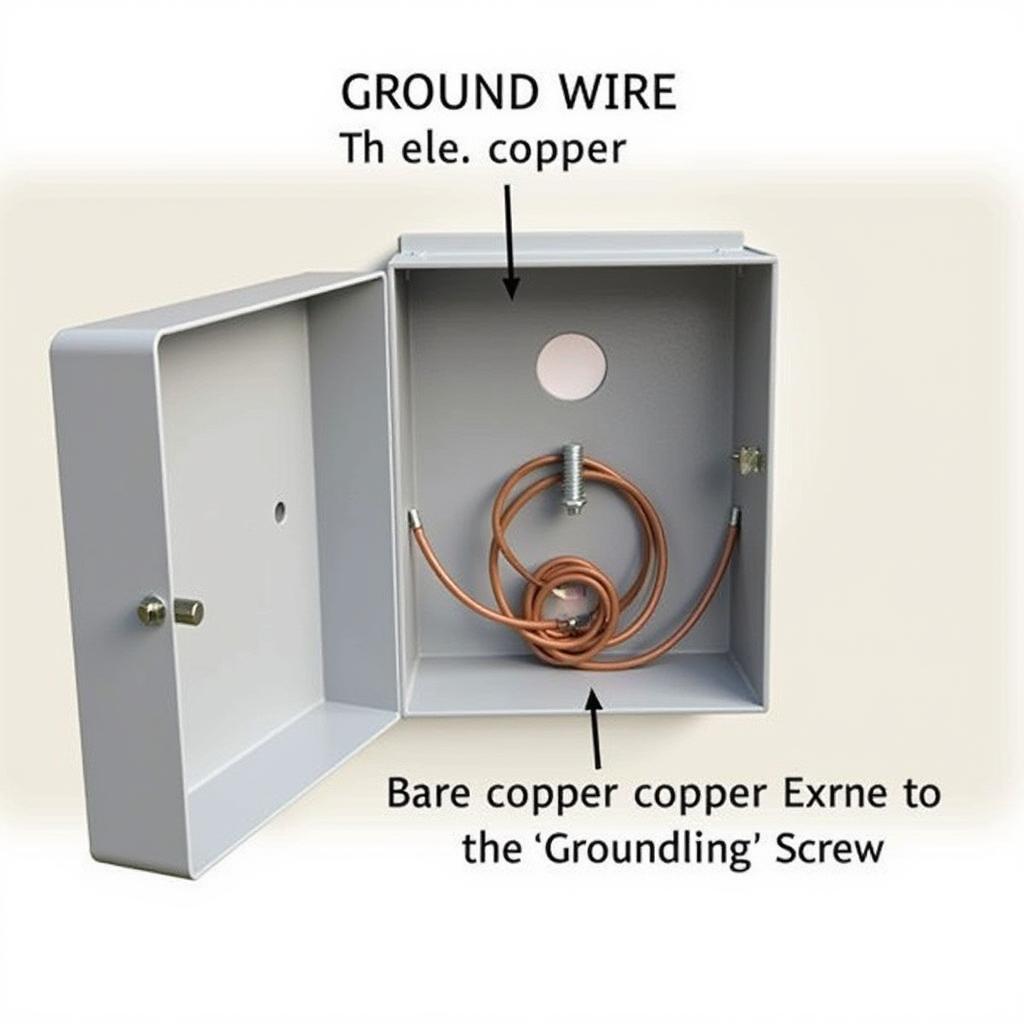Understanding the color coding of electrical wires is crucial for safety and proper electrical work in your home. Knowing what color is the ground wire on a household circuit is essential for anyone tackling DIY electrical projects or even just wanting to understand their home’s wiring.
Identifying the Ground Wire: Color and Purpose
The ground wire on a household circuit is typically bare copper, green, or sometimes green with a yellow stripe. Its primary function is to provide a safe path for stray electrical currents to flow back to the earth, protecting you from electric shock. This wire is connected to the grounding rod in your electrical system, ensuring a direct pathway to the ground.
Why is Grounding Important?
Grounding is a vital safety feature in any electrical system. It prevents dangerous voltage buildup on metal parts of appliances and fixtures. If a fault occurs, the ground wire directs the excess current away, minimizing the risk of electric shock or fire. Imagine a faulty appliance shorting out. Without a ground wire, the metal casing of that appliance could become energized, presenting a serious shock hazard. The ground wire provides an alternative, safe path for the electricity to follow.
Common Ground Wire Misconceptions
There are a few common misconceptions surrounding ground wires. One is that the ground wire carries the current back to the source. This is incorrect. The neutral wire handles the return current. The ground wire only comes into play when there’s a fault. Another misconception is that all circuits require a ground wire. While most modern circuits do, older homes with two-wire systems may not. This doesn’t necessarily mean they are unsafe, but it does highlight the importance of having a qualified electrician inspect and upgrade older wiring. Similar to what color is neutral wire, the ground wire color can sometimes be confusing in older installations.
Working with Ground Wires
When working with electrical wiring, always turn off the power at the breaker box before handling any wires. This is the most important safety precaution. Never assume the power is off; always double-check with a non-contact voltage tester. Once the power is off, carefully inspect the wiring. The ground wire should be securely connected to all grounded metal boxes, appliances, and fixtures.
Ground Wire Connections
Ensure the ground wire is securely fastened to the grounding screw or terminal. A loose connection can negate the protection the ground wire offers. Use the correct wire connectors and ensure a tight fit. When joining ground wires, make sure the connection is clean and solid. This is especially important in areas prone to moisture. Understanding which color is switch for ceiling fan switch is also important when working with household circuits.
 Secure Ground Wire Connection in an Electrical Box
Secure Ground Wire Connection in an Electrical Box
What if the Ground Wire is Missing?
If you encounter a situation where a ground wire is missing, especially in older homes, it’s best to consult a qualified electrician. They can assess the situation and recommend the best course of action, which may involve upgrading the wiring to include a ground. This is also related to understanding what is the color of a neutral wire.
Conclusion
Knowing what color is the ground wire on a household circuit is vital for electrical safety. Remember, the ground wire is typically bare copper, green, or green with a yellow stripe. Its purpose is to protect you and your home from electrical hazards. Always prioritize safety when working with electricity and consult a qualified electrician if you have any doubts or concerns. Understanding the role of the ground wire is key to a safe and properly functioning electrical system. It’s also important to know what color wire is the load and what color is positive and negative on a battery for other electrical projects.
FAQ
- What happens if the ground wire is disconnected? A disconnected ground wire increases the risk of electric shock if a fault occurs.
- Can I use a different colored wire for the ground? No, using a different color could lead to dangerous confusion.
- How do I test if my ground wire is working? A qualified electrician can test the grounding system.
- Do I need a ground wire for every appliance? Most modern appliances require a ground wire for safety.
- What should I do if my ground wire is damaged? Replace the damaged section or consult an electrician.
- Is it safe to touch a ground wire? No, while designed for safety, it’s best to avoid touching any electrical wires.
- How often should the ground wire be checked? Regular electrical inspections can identify potential ground wire issues.
Need assistance with your electrical projects? Contact us at Phone Number: 0373298888, Email: [email protected] or visit our address: 86 Cầu Giấy, Hà Nội. We have a 24/7 customer service team.

